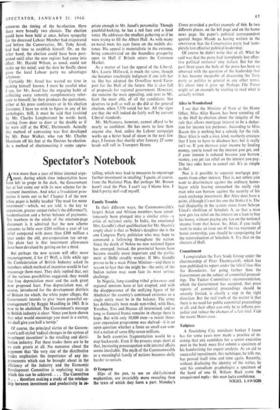Spectator's Notebook
AFTER more than a year of bitter internal argu-
ment, during which time industrialists have been left to grope in the dark, the Government has at last come out with its new scheme for in- vestment incentives. And what a fraudulent pros- pectus it turns out to be! Chapter I of the new white paper is boldly headed 'The need for more investment'—which, we are told, is the key to expansion, greater output (what's the difference?), modernisation and a better balance of payments. Yet nowhere in the whole of the nineteen-page document is it admitted that the new scheme amounts to little over £200 million a year of tax relief compared with more than £300 million a year under the old, pre-corporation tax set-up. The plain fact is that investment allowances have been devalued by getting on for a third.
But perhaps the new system will offer more encouragement, £ for £? Well, a little while ago the Confederation of British Industry asked its members which method of incentive would in fact encourage them most. They duly replied that, out of the various possibilities suggested, they would like free depreciation most and the cash grant now proposed least. Free depreciation was, of course, introduced for the development districts of Britain (to which, the white paper alleges, the Government intends to give 'more powerful en- couragement') by Reggie Maudling in 1963. It is now to be abolished. The Government's message to British industry is clear. 'Since you have shown that what would encourage you most is a carrot, we shall give you half a turnip.'
Of course, the principal victim of the Govern- ment's self-styled 'radical changes in the system of investment incentives' is the retailing and distri- bution industry. For these trades there are to be no cash grants at all. No nonsense about the argument that 'the very size of the distributive trades emphasises the importance of any im- provements which can be brought about in the efficiency of the industry and the Economic Development Committee is exploiting ways in which this can be achieved. . . . The Committee is. . . therefore making a study of the relatiou- ship betvieen investment and productivity in se-
tailing, which may lead to measures to encourage further investment in retailing.' I quote, of course, from the National Plan. But perhaps Mr. Brown hasn't read the Plan. I can't say I blame him. I find it pretty dull stuff myself.


































 Previous page
Previous page